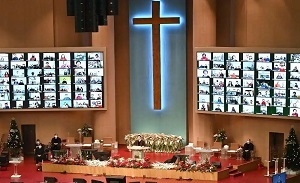
Korean Church asked to become ‘hybrid’ in post-Covid times
 The Catholic Church in South Korea needs to consider the possibility of changing to a hybrid church that utilizes both online and offline services considering the post-Covid situation, say Catholic experts. The suggestion was made in a Pastoral White Paper of the Catholic Church in Korea, which was released on Jan. 31 by the Korean Catholic Pastoral Institute of the national bishops' conference. The paper was published based on a survey, which aimed to understand the changes and perceptions among Catholics after the Covid-19 pandemic.
The Catholic Church in South Korea needs to consider the possibility of changing to a hybrid church that utilizes both online and offline services considering the post-Covid situation, say Catholic experts. The suggestion was made in a Pastoral White Paper of the Catholic Church in Korea, which was released on Jan. 31 by the Korean Catholic Pastoral Institute of the national bishops' conference. The paper was published based on a survey, which aimed to understand the changes and perceptions among Catholics after the Covid-19 pandemic.
"The current system of parishes and faith communities, which is based on the centrality of space, has been shaken by COVID-19," said Father Kim Hye-jong in the paper. “The spread of the perception that there are many things in my life that can replace Sunday Mass or devotional activities was a problem revealed by the survey,” Kim wrote while discussing the pastoral outlook on liturgical life. Several experts jointly wrote the white paper, each composing sections of it on religion, liturgy, theology, and pastoral care.
Kim suggested that in addition to face-to-face liturgy, “non-face-to-face faith formation education and care should be complementary, not substitutes."
"According to the survey results, regardless of whether they are believers or not, people are expecting the church to strengthen its public role in society," said Franciscan Father Park Moon-soo, who works with Uijeongbu Diocese Pastoral Research Institute.
"Considering the aging and decreasing mobility of the current active participants, face-to-face gatherings are not the answer," said Park while discussing pastoral outlook. Park pointed out that the influence of aging and decreasing mobility of the believers will render the face-to-face gatherings ineffective and called for a hybrid form of liturgy and devotional services.
"The answer is to become a hybrid church that actively embraces and utilizes online methods, which are also the communication methods of future generations, in addition to offline methods," Park said.
Park also criticized the passive role played by religious institutions during the Covid-19 pandemic in responding to policies and inhibiting the spread of infection. "If such a crisis occurs again, it must quickly convince believers and convince other members of society, and gain trust and authority through sacrifice and service,” Park said.
Father Hee Wan Jung, director of the Catholic Institute for Culture and Theology, pointed out that “religion has been reduced to an element of culture in the process of secularization.” “Faith has taken a back seat to economic life, health, and various other existential issues for people. Faith and religious practice are less important in the lives of people of faith,” Hee said while commenting on the results of the survey.
South Korea had around 30.6 million Covid-19 cases and 34,093 deaths due to the virus, according to CNN data. A total of 674.3 million cases of Covid-19 infection and 6.8 million deaths were reported worldwide, CNN data said.
Source: https://www.ucanews.com/news/korean
Xem bình luận
Sắp xếp

